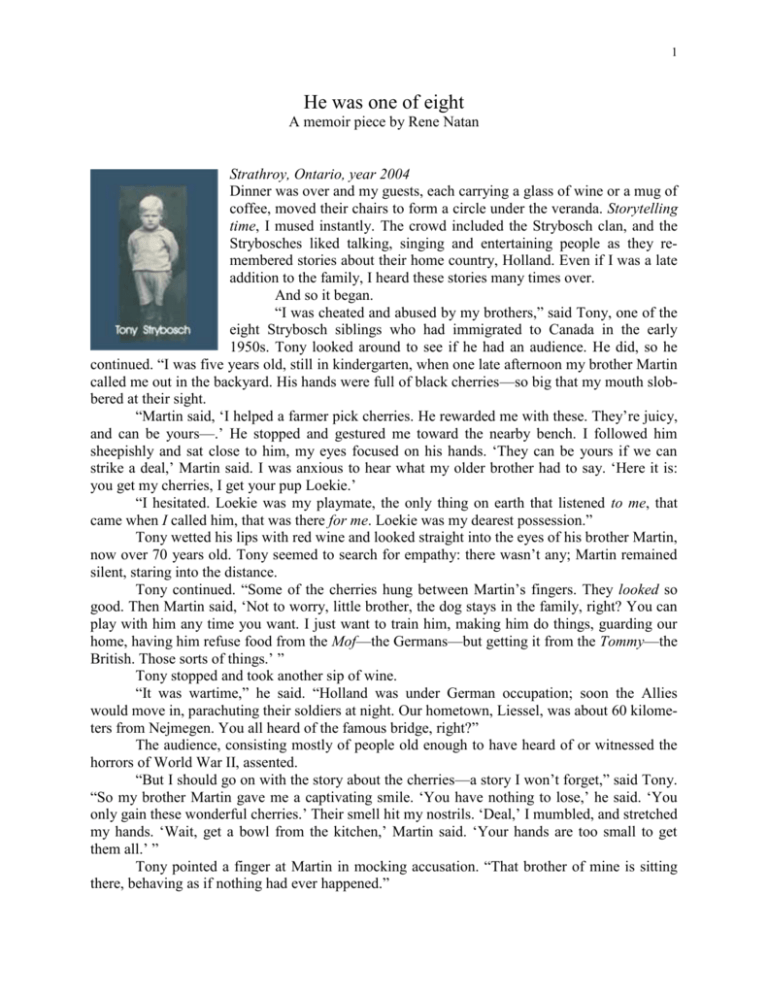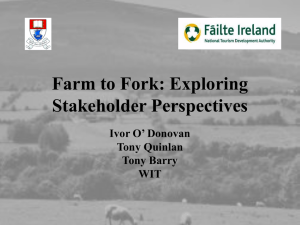to - Rene Natan
advertisement

1 He was one of eight A memoir piece by Rene Natan Strathroy, Ontario, year 2004 Dinner was over and my guests, each carrying a glass of wine or a mug of coffee, moved their chairs to form a circle under the veranda. Storytelling time, I mused instantly. The crowd included the Strybosch clan, and the Strybosches liked talking, singing and entertaining people as they remembered stories about their home country, Holland. Even if I was a late addition to the family, I heard these stories many times over. And so it began. “I was cheated and abused by my brothers,” said Tony, one of the eight Strybosch siblings who had immigrated to Canada in the early 1950s. Tony looked around to see if he had an audience. He did, so he continued. “I was five years old, still in kindergarten, when one late afternoon my brother Martin called me out in the backyard. His hands were full of black cherries—so big that my mouth slobbered at their sight. “Martin said, ‘I helped a farmer pick cherries. He rewarded me with these. They’re juicy, and can be yours—.’ He stopped and gestured me toward the nearby bench. I followed him sheepishly and sat close to him, my eyes focused on his hands. ‘They can be yours if we can strike a deal,’ Martin said. I was anxious to hear what my older brother had to say. ‘Here it is: you get my cherries, I get your pup Loekie.’ “I hesitated. Loekie was my playmate, the only thing on earth that listened to me, that came when I called him, that was there for me. Loekie was my dearest possession.” Tony wetted his lips with red wine and looked straight into the eyes of his brother Martin, now over 70 years old. Tony seemed to search for empathy: there wasn’t any; Martin remained silent, staring into the distance. Tony continued. “Some of the cherries hung between Martin’s fingers. They looked so good. Then Martin said, ‘Not to worry, little brother, the dog stays in the family, right? You can play with him any time you want. I just want to train him, making him do things, guarding our home, having him refuse food from the Mof—the Germans—but getting it from the Tommy—the British. Those sorts of things.’ ” Tony stopped and took another sip of wine. “It was wartime,” he said. “Holland was under German occupation; soon the Allies would move in, parachuting their soldiers at night. Our hometown, Liessel, was about 60 kilometers from Nejmegen. You all heard of the famous bridge, right?” The audience, consisting mostly of people old enough to have heard of or witnessed the horrors of World War II, assented. “But I should go on with the story about the cherries—a story I won’t forget,” said Tony. “So my brother Martin gave me a captivating smile. ‘You have nothing to lose,’ he said. ‘You only gain these wonderful cherries.’ Their smell hit my nostrils. ‘Deal,’ I mumbled, and stretched my hands. ‘Wait, get a bowl from the kitchen,’ Martin said. ‘Your hands are too small to get them all.’ ” Tony pointed a finger at Martin in mocking accusation. “That brother of mine is sitting there, behaving as if nothing had ever happened.” 2 “Not a fault of mine if you weren’t too bright.” Martin shrugged. “See, see what kind of brother I had to grow up with? And wait until I tell you the story about the horse and the fence…” His vivid eyes circled the crowd, creating an expectation we all knew he would fulfill. Tony is now 66 year old. The abuses he claims to have suffered make great stories and he knows it; but there is no trace of resentment in his heart. He is well aware that his older siblings had to face a difficult task and he was part of it. Little Tony’s trouble with his dog was only the beginning of real big troubles. Two years later, in 1946, the four Strybosch brothers—John, Martin, Bill, Tony—and the four sisters, namely Nellie, Josephine, Antonia and Ricky, lost their mother to a heart attack. One year later, their father died from cancer. The siblings’ ages ranged from 23 to eight. At the age of 23, John already exhibited a remarkable ability to elicit consensus. Under his guidance, for a few years the eight orphans managed on their own. They owned a farm situated in Liessel, North Brabant. It was a 24-acre cultivated field double the size of the average Dutch farm. They worked their land with horses, gathered milk from farmers to deliver to the local co-op, and threshed grains for other farmers. Martin was the most active. At six o’clock in the morning he left for the milk route; the remainder of the day he plowed the fields, and taught tricks to his dog Loekie. But the love of his life was horses. He ran in country races and trained them patiently, both for work and for fun. One horse, Voske, was his favourite: he listened to each of his commands and jumped like a champion. He didn’t need even the smallest incitement; if Voske saw a fence, he would go for it, and jump a foot higher than necessary. And this was 10-year old Tony’s misfortune. Tony resumed his narration. “That day things were grim. ‘Do this; do that,’ Bill, then 13, ordered me. ‘Pay attention! Don’t do that!’ Martin, 16, screamed next. I was their little slave, that’s what I was. So I cried aloud, ‘I’m old enough to work, but not to play with the horse! It’s more fun!’ It was then that Martin said, ‘Okay, okay, want to ride? Sure, here is the horse. You can go and ride. Take him for a run on the road.’ He gladly helped me on the horse.” Tony paused. “You know what those two terrible brothers of mine did? After I had a little ride and then turned around to take the horse back to the stable, Martin and Bill put up a fence, about a metre and half high. That’s what they did!” “You should have seen that horse,” Martin said. “With no hesitation he went on a gallop and ran toward the fence, even if there was ample room on both sides. When Voske asked for more bridle poor little Tony didn’t hesitate to release it. As Voske arched his forelegs upwards Tony flew in the air, flipped around once and then fell on the ground, unconscious.” “See how he tells the story?” Tony said. “Like it was fun!” “It’s fun to remember it.” Martin laughed, “I admit it, but I can assure you that both Bill and I got the scare of our lives. We rushed to you, and took you to the house. We stayed with you until you reopened your eyes. Fortunately there were no serious injuries.” “How in the world did you know?” Tony asked. “You were the same silly little brother after the fall as you were before.” *** 3 A careless financial investment left the eight orphans with little possession. They decided to search better living conditions abroad. In 1950 Josephine got married and immigrated to Ontario with her husband Harry. A year later the seven siblings flew to Montreal with a onehundred dollar bill in their pockets. At the railway station they immediately lost one of those precious bills to an unscrupulous porter who didn’t have any change, but who made up for the lack of it with repeated, deep bowing. Not speaking a word of the local language, they had no way to react. They took their loss in stride. A few hours later the seven orphans boarded the train and arrived in London, Ontario, where they met their sponsor, the Van Den Boomen family. One short drive to Strathroy and the Strybosches were ready to begin the adventure of their life. It all started in a big house on a Caradoc concession. Searching for work, learning the language, buying a car and finding a school for Tony were the most impelling necessities. A couple of months later the family rented a farmer’s house on Highway 22. Nellie got married. John and Bill shared a 1940 Dodge to get to work at a glass factory; Martin picked tobacco, corn, and sugar beets; Antonia ran the household; Ricky helped a nursery’s owner with house chores. Little Tony went to the local country school which was one big room where children in different grades gathered together. The difficulty of following what the teacher had to say in an unfamiliar language and Tony’s impatience for action didn’t create the best atmosphere for learning. When the family moved back to Strathroy, teenaged Tony made the first attempt to explore the world on his own. He played hooky and frequented places that he was not supposed to. The family worried; none of its members had training in parenting so they had to improvise. After a quick democratic consultation, the emerging consensus was to take Tony away from all temptations of the city (Strathroy at that time boasted 3,000 souls!) and send him to work on a farm in Lambton County, 20 kilometres away. The farm’s owner was Elgin Vilancy Fuller, a shorthorn cattle breeder who took a liking to the youth. As he worked beside the farmer, Tony gained invaluable experience. He learned about crop rotation and fertilizers; how to harvest using a combine; and how to repair farming machinery. Tony felt good because he could earn more than his keep and thus contribute to the family in a concrete way. In the early and middle ‘50s events moved fast for the Strybosch family. John, Antonia and Martin got married. The siblings called Tony back from his exile. In 1956, four members of the family, including Tony, bought a 150-acre farm in Kerwood. Tony became a full participant in the Strybosches affairs. Now Tony figured he should look for a girlfriend. Tony recalls the difficulty, even then, of breaking loose from the family supervision. He loves to prove it by mentioning the following episode. I leave it up to Tony to report it in his usual, colourful style. “I was sitting in the back of the car with my new date. I had already surpassed myself trying to create a romantic atmosphere: I had praised the young woman for her lovely dress and told her she had a wonderful smile… I was waiting for the proper time to get a bit closer. I hoped for some necking;—that’s the word we used at that time.” Tony can’t refrain from laughing. “You wouldn’t guess what happened next!” He chuckled again. “Ricky, my youngest and very religious sister, was sitting at the front; her husband was behind the wheel. As I moved closer to the girl, Ricky began reciting the Holy Rosary—softly at first, then louder and louder. That was bad, but things became much worse when she turned sideways—one eye on the beads, the other on me and my date.” Tony focused his eyes on Ricky, seated opposite him. 4 The sister didn’t deny the fact; she merely ignored Tony. Her face wore a smirk from coast to coast. But Tony was a young, resourceful man. He soon found his soul mate in Dianne Elaine Cattrysse, a beautiful woman who shared his love for the land and the animals. In 1964, Tony and Dianne got married. All the siblings bought out from the farm, Tony and Dianne became involved in a very promising venture. Over the years they expanded their business to a 650-acre farm—the Lysel Holsteins—and made the transition from part-purebred-grade herd to all purebreds (about 60 milking cows and 100 young head). In the 1980s and 1990s they were recognized as the owners of one of the best Canadian herds. In those years, three All Reserve All American Cattle were from their herd. They won numerous prizes, including, in 1987, an All Canadian Breeder Herd nomination. Family life blossomed too, as five handsome children filled their home with laughter and joy. The little boy from Holland, who had lost his parents at the age of eight, who had moved to a foreign country without mumbling a word of English and without having any idea of what to expect, made it with flying colours. Close to retiring from farming at the time of writing, my brother-in-law Tony is currently chair of the board of directors of the St. Willibrord Credit Union, a financial institution originally founded by Dutch immigrants to help newcomers from Holland settle in Ontario. And this is the end of my story.







